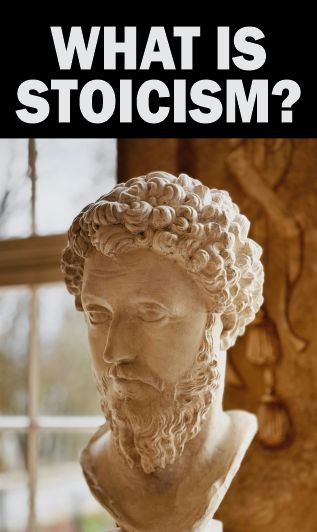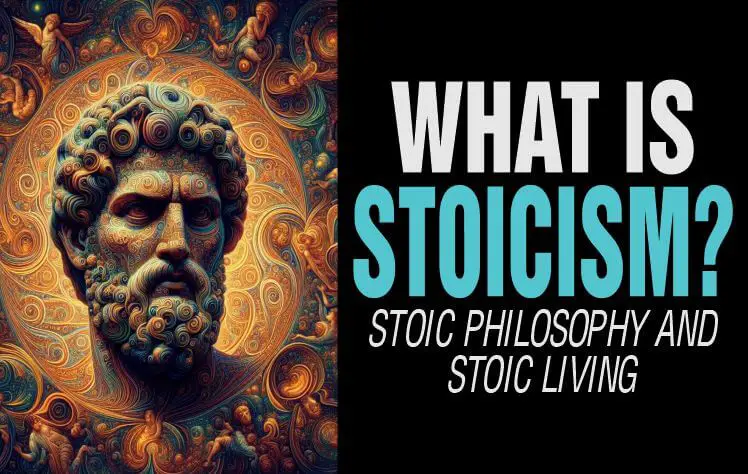Last updated on September 15th, 2024 at 11:04 am
Explore the foundations and key figures of Stoicism, an ancient Greek philosophy founded by Zeno of Citium that offers timeless wisdom for life mastery. So what is Stoicism, and how does it affect you?
Discover the principles of Stoicism that emphasize emotional resilience, and rationality, such as the dichotomy of control, the four cardinal virtues, and the practice of living by nature.
Learn how this belief can promote mental well-being, manage stress, and promote personal growth. This comprehensive guide also discusses the core tenets of Stoic thought and provides strategies for integrating its teachings into daily practices for a fulfilling existence.
Discover how modern interpretations of Stoic principles offer practical advice for managing emotions, decision-making, and personal growth, ensuring its relevance in today’s world.
Recommended: The Four Virtues Of Stoicism
You might want to pin the image below.

Table of Contents
- Key Takeaways
- What is Stoicism?
- Brief History of Stoicism
- Core Principles of Stoic Philosophy
- The Daily Practice of Stoicism and Exercises
- Stoicism in Modern Life
- Key Stoic Figures
- Key Stoic Texts and Works
- Stoicism vs. Other Philosophical Schools
- The Influence of Stoicism on Modern Thought
- Stoicism and Emotion
- Resources to Learn More about Stoicism
- Frequently Asked Questions
- Final Thoughts
Key Takeaways
- Stoicism teaches focusing on what’s within control, embracing virtue, and living in harmony with nature for tranquility.
- Founded by Zeno of Citium, was shaped by Seneca, Epictetus, and Marcus Aurelius, influencing Western thought profoundly.
- The philosophy distinguishes between rational and irrational emotions, promoting emotional resilience through practices like mindfulness and self-reflection.
- Stoic philosophy is increasingly popular for personal development, offering strategies for managing stress, and uncertainty, and making ethical decisions.
Suggested: Stoicism in personal and workplace relationships
What is Stoicism?

Stoicism is an ancient Greek philosophy founded around 300 BCE, which emphasizes the development of personal virtue and wisdom as a means to achieve a tranquil and fulfilling life. Central to Stoic thought is the belief that individuals should focus on what is within their control, such as their thoughts, emotions, and actions while accepting what is beyond their control with equanimity.
Founded by Zeno of Citium, Stoic belief has evolved, influencing Western thought and culture.
The core tenets of Stoic philosophy emphasize resilience, virtue, and the importance of emotional control in navigating life’s challenges.
Stoics believe that individuals should focus on what is within their control while accepting what is beyond it. This empowers practitioners to cultivate tranquility and poise amid external chaos.
The teachings of Stoic living were further developed by notable philosophers such as Seneca, Epictetus, and Marcus Aurelius, each contributing to its rich tradition.
At the heart of Stoicism lies the idea that external events are neutral; it is the individual’s response to these events that determines their emotional state.
Stoics advocate for a rational approach to emotions, arguing that the only true good is virtue and that external possessions or status are indifferent.
This separation between internal values and external circumstances has made Stoicism particularly applicable to modern life.
In modern society, where anxiety and stress are commonplace, Stoicism resonates with many individuals seeking a framework for resilience.
Its emphasis on mindfulness and virtue encourages people to cultivate a sense of purpose and strength.
By focusing on self-discipline and ethical living, Stoics assert that you can build emotional resilience, enabling you to cope with adversity more effectively.
Ultimately, this belief serves as a guide for personal growth, urging you to live according to your highest values while maintaining composure in the face of life’s inevitable challenges.
Related: The Core Principles of Stoicism
Brief History of Stoicism

Stoicism, as a prominent school of philosophy, traces its roots back to the early 3rd century BCE, emerging in Athens under the guidance of its founder, Zeno of Citium.
Zeno, originally from Cyprus, began his philosophical journey after a shipwreck led him to Athens, where he immersed himself in the teachings of various philosophical traditions, including Cynicism and Socratic thought.
This synthesis gave rise to Stoicism, which would develop into a rich intellectual tradition over the following centuries.
Following Zeno, Stoic practice saw significant growth through key figures such as Cleanthes and Chrysippus, who expanded on Zeno’s ideas.
Chrysippus, in particular, is credited with systematizing Stoic thought, establishing the foundational concepts of logic, ethics, and natural philosophy that characterize the school.
During this early period, Stoicism began to gain traction and attracted a varied following among the educated elite of Athens.
The influence of Stoicism spread throughout the Hellenistic world, particularly during the Roman Empire.
Notable Stoic philosophers, including Seneca, Epictetus, and Marcus Aurelius, further developed and popularized the belief, emphasizing practical ethics and personal resilience.
This era is often regarded as the peak of Stoic thought, where teachings became more accessible, focusing on how individuals can attain a virtuous life amidst external adversity.
Stoicism has been structured into four main periods:
- The Early Stoa, characterized by Zeno and his immediate followers;
- The Middle Stoa, marked by figures from the Hellenistic period;
- The Late Stoa, which includes the works of prominent Romans; and
- The Neostoicism movement during the Renaissance.
Each phase contributed to the evolution of Stoic philosophy, enriching its principles and relevance.
This historical backdrop underscores the enduring influence of Stoic practice, which continues to resonate in contemporary discussions about resilience and ethical living.
Related: Becoming A Stoic Personality
Core Principles of Stoic Philosophy

Virtue
At the heart of Stoic philosophy lies the concept of virtue, which is considered the only true good.
Virtue is defined as living by nature and reason, thereby aligning your actions with the universal order.
This idea underscores that external circumstances do not dictate one’s happiness; rather, it is our responses to these circumstances that define our well-being.
Dichotomy of Control
Central to Stoic belief is the dichotomy of control, a principle that divides what is within our control from what is not.
Stoics advocate focusing solely on your thoughts and actions, elements that are within personal control while accepting the external realities that cannot be changed.
This understanding promotes emotional resilience, as practitioners learn to release attachment to outcomes beyond their influence, thereby minimizing frustration and anxiety.
Related: Why The World Needs More Stoic Men
Rationality
Rationality plays a crucial role in the Stoic way of life. Stoics believe that human beings can reason, which can lead them to make wise decisions.
Reason allows one to evaluate situations objectively, leading to judicious actions that are aligned with their moral compass instead of succumbing to passions or impulses. The cultivation of common sense is essential for navigating life’s challenges in a Stoic manner.
Four Cardinal Virtues of Stoicism
Furthermore, the four cardinal virtues of Stoicism:
- Wisdom,
- Courage
- Temperance, and
- Justice
These virtues serve as guiding principles for ethical conduct.
Wisdom covers the ability to discern right from wrong; courage involves facing difficulties with integrity; temperance relates to self-control in the face of excess; and justice emphasizes fairness and accountability in interactions with others.
By possessing these virtues, you can achieve a harmonious existence, contributing positively to themselves and society at large.
Related: How to Live in the Present Moment
The Daily Practice of Stoicism and Exercises

Applying Stoic philosophy in everyday life can significantly help you manage stress, enhance decision-making, and foster resilience.
Differentiating What is Within Your Control and What is Not
One of the core tenets of Stoicism is the differentiation between what is within your control and what is not.
By focusing your energies on the former, you can reduce anxiety and cultivate a more peaceful state of mind.
For instance, when facing a stressful situation at work, you can evaluate whether the stress stems from factors they can influence, such as their own reactions or work habits, or from external circumstances beyond their control.
By letting go of concerns related to the latter, a person can conserve mental energy for improvements they can effectuate.
Negative Visualization
Moreover, Stoicism encourages the practice of negative visualization, which involves contemplating potential challenges or losses.
This technique not only prepares you for adverse outcomes but also instills an appreciation for current circumstances.
By regularly engaging in negative visualization, you become more resilient, as you are equipped to handle disappointments that may arise.
Reframing Thoughts
Another practical strategy derived from the belief is the practice of reframing thoughts.
When negative events occur, instead of viewing them solely as setbacks, Stoics encourage seeing them as opportunities for growth and learning.
For example, if a job application is rejected, one might reframe the experience as valuable feedback that can be used to improve future applications, encouraging a mindset of ongoing personal development.
Suggested: Emotional intelligence
Daily Reflections
At the core of Stoic practice are daily reflections, which encourage you to assess your thoughts and behaviors.
Morning reflections often involve setting intentions for the day, examining potential obstacles, and preparing yourself mentally to remain focused on your values and priorities.
Conversely, evening reflections encourage you to analyze your actions and emotional responses throughout the day, ushering in a deeper understanding of yourself and encouraging growth.
Journaling
Journaling represents another essential practice. By documenting thoughts, feelings, and daily experiences, you can cultivate greater self-awareness and clarity.
The act of writing allows for the exploration of personal challenges and facilitates the identification of areas for improvement.
Journaling can also serve as a powerful tool for processing emotions and thoughts, transforming them into actionable insights.
This practice aligns with the Stoic principle of examining one’s thoughts to promote emotional regulation.
Mindfulness
Mindfulness, a key aspect of many contemporary wellness practices, has roots in Stoic philosophy.
It involves being present and fully engaged in the moment, enabling individuals to observe their thoughts and emotions without judgment.
This heightened awareness promotes a sense of tranquility and helps in managing stress.
Through mindfulness, Stoics cultivate an attitude of detachment from external circumstances, focusing instead on what they can control, their thoughts and reactions.
Emotional Control
Finally, emotional control techniques are fundamental to Stoic practice. By recognizing negative emotions and understanding their transient nature, individuals can regain composure during challenging situations.
Techniques such as cognitive reframing and the practice of visualization aid in developing emotional resilience.
Embracing these Stoic ideals encourages individuals to navigate life’s uncertainties with poise and clarity.
Related: Stoicism and Mental Health
Stoicism in Modern Life
Stoicism, rooted in resilience, offers profound insights that remain relevant in today’s fast-paced and often tumultuous world.
As individuals face pressures related to mental health, personal relationships, leadership dynamics, and overall personal growth, the tenets of Stoicism serve as a guiding framework to cultivate a more balanced life.
The central Stoic principles of virtue, self-control, and rationality can help you navigate these life hurdles effectively.
Stoicism and Mental Health
One significant application of Stoicism is its impact on mental health. Many contemporary issues, such as anxiety and stress, can be addressed through Stoic practices that emphasize mindfulness and emotional regulation.
The Stoic habit of reflecting on one’s thoughts and emotions encourages individuals to examine their responses to challenges, fostering a sense of tranquility amidst external chaos.
By focusing on what is within their control and accepting what is not, individuals can reduce their anxiety levels, thus enhancing their psychological well-being.
Stoicism and Relationships
Additionally, Stoicism influences personal relationships. By advocating for empathy and understanding, Stoics encourage individuals to cultivate patience and compassion towards others.
This can lead to healthier relationships both personally and professionally.
In leadership, Stoic principles can equip leaders with the tools to remain calm under pressure, make rational decisions, and inspire their teams through example.
The emphasis on integrity and virtue in Stoicism aligns well with effective leadership practices, which prioritize ethical decision-making.
Stoicism and Personal Growth
It encourages personal growth by urging individuals to embrace challenges as opportunities for development.
The idea of viewing obstacles as a chance to practice resilience can motivate you to step out of your comfort zone, ultimately leading to a more fulfilling and meaningful life.
By integrating Stoic philosophy into daily routines, you not only adapt to modern life’s demands but also cultivate a mindset rooted in resilience, strength, and personal excellence.
Related: Stoic Approach to Relationship Conflicts
Key Stoic Figures
Stoicism, as a school of philosophy, has been profoundly influenced by several key figures throughout history.
Zeno of Citium
Among the earliest was Zeno of Citium, the founder in the early 3rd century BCE.
Zeno’s teachings emphasized the importance of reason as a means to achieve virtue and happiness.
He proposed that living by nature and accepting fate were essential to a fulfilling life.
Zeno’s doctrines laid the groundwork for many Stoic concepts that followed.
Chrysippus
Chrysippus, a student of Zeno, significantly advanced Stoic philosophy during his time.
He is often credited with systematizing Stoic thought and is known for his work in logic, ethics, and natural philosophy.
Chrysippus elaborated on key ideas, including the interconnectedness of all things and the significance of assent in the process of reasoning.
His rigorous approach helped position Stoicism as a formidable intellectual tradition within the Hellenistic world.
Seneca
Another pivotal figure is Seneca, a Roman statesman and playwright who contributed to Stoic philosophy through his extensive writings.
His essays and letters, which often reflect on personal ethics and moral philosophy, emphasize practical wisdom and the importance of self-control.
Seneca’s thoughts on the fleeting nature of time and the value of moral integrity continue to resonate, making him a key source of Stoic guidance.
Epictetus
Epictetus, a former slave-turned-philosopher, also played a crucial role in shaping Stoic practice.
His teachings were transcribed by his student Arrian in the “Discourses” and the “Enchiridion.”
Epictetus focused on the distinction between what is within our control and what is not, encouraging individuals to focus on personal virtues rather than external circumstances.
His emphasis on inner strength and resilience influenced later interpretations of Stoicism.
Marcus Aurelius
Lastly, Marcus Aurelius, the Roman Emperor, is perhaps the most renowned Stoic thinker.
In his personal writings known as “Meditations,” he reflected on the principles of Stoicism, emphasizing the importance of rationality, humility, and duty.
His thoughts serve as a practical guide for maintaining one’s integrity in the face of life’s challenges, illustrating how Stoic philosophy can be applied in leadership and daily life.
Key Stoic Texts and Works
Understanding Stoicism is greatly improved by exploring its foundational texts, each of which offers unique insights into the philosophy’s core principles and practical applications.
Notable works include ‘The Enchiridion’ by Epictetus, ‘Letters from a Stoic’ by Seneca, and ‘Meditations’ by Marcus Aurelius.
The Enchiridion
‘The Enchiridion’ is a concise manual of practical ethical advice that distills essential Stoic teachings.
Written by Epictetus, a former slave who became a prominent Stoic teacher, this text emphasizes the importance of recognizing what is within our control and what lies beyond it.
It advocates for the acceptance of circumstances and stresses the cultivation of inner virtue as a means to achieve tranquility.
Epictetus’s work serves as a guide to navigating life’s challenges through a Stoic lens.
Letters from a Stoic
Seneca’s ‘Letters from a Stoic’ is a collection of correspondence in which he offers guidance on how to live a virtuous life.
These letters explore topics such as the transient nature of wealth, the inevitability of death, and the importance of friendship.
Seneca’s reflections often intertwine personal anecdotes with philosophical insights, making the text not only informative but also relatable.
His epistolary style invites readers to engage with Stoic philosophy in their everyday lives, illustrating how resilience can be cultivated through reflective practice.
Meditations
‘Meditations’ by Marcus Aurelius is perhaps the most personal of these texts; it is a series of private notes intended as a source of self-improvement for the Roman Emperor.
This work delves into concepts such as duty, reason, and the acceptance of leadership challenges.
Marcus Aurelius articulates the necessity of maintaining inner peace through rational thought, even in the face of adversity.
His contemplations provide a powerful testament to how Stoicism can guide one through the complexities of life.
These key texts illuminate the rich tapestry of Stoic philosophy, making them indispensable for those seeking to understand or practice this ancient system of resilience and personal growth.
Related: self-mastery
Stoicism vs. Other Philosophical Schools
Stoicism presents a distinct perspective on life that contrasts sharply with other philosophical schools such as Epicureanism and Cynicism.
A fundamental tenet of Stoicism is the emphasis on virtue and personal conduct, which posits that true happiness is achieved through wisdom and rational action, rather than through the pursuit of pleasure.
This separates it from Epicureanism, which advocates for the pursuit of pleasure as the highest good.
While Epicureans argue that seeking pleasure is essential to a fulfilling life, Stoics maintain that such pursuits may lead to emotional suffering.
Also, Stoicism encourages active engagement in societal matters, believing that individuals have a responsibility to contribute positively to their communities.
In contrast, Cynicism promotes asceticism and withdrawal from societal norms, viewing contemporary values as corrupt.
The Cynic philosophy prizes independence and self-sufficiency over engagement, often eschewing societal conventions and material desires.
Stoics, however, advocate for embracing life’s challenges and contributing to the common good, reflecting the belief that one’s character and actions define their existence.
In Modern Contexts
In modern contexts, Stoicism has found resonance among proponents of self-help and personal development philosophies.
While some contemporary self-help frameworks echo Stoic principles, they may occasionally diverge by placing an excessive focus on individual success or the accumulation of resources.
Stoicism, though, emphasizes resilience in the face of adversity, framing challenges as opportunities for personal growth.
This foundational aspect, alongside its focus on emotional regulation and rational thought, positions Stoicism uniquely within the philosophical landscape, favoring a balanced approach to pleasure, duty, and societal participation.
Related: What is Individualism?
The Influence of Stoicism on Modern Thought
Stoicism has continued to exert a notable influence on modern thought, particularly in the areas of psychology and self-help practices.
Cognitive Behavioral Therapy
One of the most significant adaptations of Stoicism can be traced to cognitive behavioral therapy (CBT), a widely practiced therapeutic approach that emphasizes the connection between thoughts, emotions, and behaviors.
CBT shares core tenets with Stoic teachings, particularly the notion that our perceptions shape our reality and that rational thinking can mitigate emotional distress.
By adopting a Stoic perspective, individuals can cultivate resilience, leading to enhanced coping mechanisms in the face of adversity.
Modern Mindfulness Practices
Stoicism has found resonance in modern mindfulness practices. The Stoic idea of living by nature and focusing on the present moment aligns closely with mindfulness principles.
Both philosophies encourage practitioners to acknowledge their thoughts and feelings without judgment, promoting an acceptance that can diminish anxiety and stress.
The mindful application of Stoic philosophies allows you to negotiate the troubles of modern life with greater equanimity and purpose.
Popular Culture and Media
The Stoic belief also has permeated popular culture, influencing various media, literature, and motivational discourse.
Numerous authors and thought leaders advocate for the application of Stoic principles as a means to promote personal empowerment and resilience.
Works such as Ryan Holiday’s “The Daily Stoic” and Mark Manson’s “The Subtle Art of Not Giving a F*ck” illustrate the philosophy’s relevance, encouraging readers to confront challenges head-on while maintaining a sense of inner peace.
The appeal of Stoicism is evident within social media platforms, where quotes from Stoic philosophers are disseminated widely, inspiring individuals to embrace a mindset characterized by strength and self-control.
Related: Cultivating self-awareness
Stoicism and Emotion
Stoic living offers a well-rounded approach to understanding and managing emotions.
Central to Stoic philosophy is the belief that although we cannot control external events, we can control our internal responses.
This is particularly significant when it comes to emotional regulation.
Stoics advocate for recognizing the difference between rational and irrational emotions, emphasizing that emotional well-being arises from this discernment.
Categories of Emotions
The Stoics categorize emotions into two primary types: good emotions, known as eupatheia, and destructive passions, called pathos.
Good Emotions
Good emotions are those aligned with reason and virtue, such as joy, caution, and wishing well for others. These positive emotions are believed to contribute to one’s overall tranquility and rational decision-making, supporting life in harmony with nature and reason.
Destructive Passions
On the other hand, destructive passions are considered irrational responses that arise from false beliefs and judgments. These include excessive anger, fear, and pleasure, which disrupt one’s inner peace and lead to a turbulent mind.
According to the principles, the root cause of these negative emotions is an erroneous perception of what constitutes good or bad.
By correcting these perceptions, individuals are better equipped to manage their emotional responses effectively.
Related: Impacts of Stoicism on Men
Resources to Learn More about Stoicism
For those interested in deepening their understanding of Stoicism, a variety of resources are available, ranging from classic texts to modern online communities.
A fundamental starting point is reading primary texts by renowned Stoic philosophers.
The works of Marcus Aurelius, particularly “Meditations,” provide profound insights into Stoic thought and practical applications in daily life.
Seneca’s letters, featured in “Letters from a Stoic,” further explore Stoic wisdom in the context of personal challenges, making them accessible and relevant.
Another essential work is Epictetus’ “Enchiridion,” a concise manual that encapsulates key Stoic principles.
For contemporary interpretations, consider “A Guide to the Good Life: The Ancient Art of Stoic Joy” by William B. Irvine, which offers practical advice on applying Stoic ideas in today’s world.
Additionally, Ryan Holiday’s “The Obstacle Is the Way” effectively demonstrates how Stoic philosophy can be harnessed to overcome challenges and setbacks.
Online platforms also serve as valuable tools for those wanting to engage with Stoicism actively.
Websites such as ModernStoicism.com offer articles, resources, and forums for discussion.
The Stoic Fellowship is an excellent community for like-minded individuals to share experiences and strategies within the context of Stoic practice.
Furthermore, social media platforms host various groups focused on Stoicism, providing an interactive way to explore the philosophy.
Frequently Asked Questions
What is Stoicism in simple words?
It is an ancient philosophy teaching self-control, resilience, and virtue to achieve inner peace and live a meaningful life.
What do Stoics believe in?
Stoics believe in cultivating inner strength, accepting what cannot be changed, and living by nature.
What are the 4 rules of Stoic living?
The four rules of stoic living are wisdom, courage, justice, and temperance, guiding ethical living and personal development.
Is Stoic principles against Christianity?
It is not inherently against Christianity, as it focuses on personal virtue and resilience, but differs in theological beliefs.
Final Thoughts
Conclusion
Stoicism offers timeless insights into resilience and mental fortitude by focusing on what we can control and accepting what we cannot.
By practicing the virtues of wisdom, courage, justice, and temperance, you navigate life with clarity and purpose.
Stoic belief encourages action, strengthening emotional intelligence and fostering healthier relationships.
Its principles apply to both personal and professional life, enhancing decision-making and well-being.
To embrace Stoic living, engage in reflective practices like journaling and mindfulness, fostering self-awareness and growth.
This philosophy guides individuals in building character, adapting to change, and positively influencing their environment.
If you are pleased with this article, others might also be pleased with it. Please do share to spread the good word.
References:
- https://dailystoic.com/what-is-stoicism-a-definition-3-stoic-exercises-to-get-you-started/
- https://www.holstee.com/blogs/mindful-matter/stoicism-101-everything-you-wanted-to-know-about-stoicism-stoic-philosophy-and-the-stoics
- https://whatisstoicism.com/what-is-stoicism/
- https://www.thecollector.com/what-is-stoicism-the-stoics-beliefs/
Pyo Merez (PsyD) is a distinguished adolescent and adult psychologist at the forefront of mental health advocacy.
With expertise in cognitive and developmental psychology, focusing on social relationships, cultural contexts, and individual differences, Pyo has dedicated his career to empowering adolescents and adults.
As a sought-after speaker and panelist, Pyo shares invaluable insights on issues affecting young people, contributing to a deeper understanding of mental health and well-being in today's society.




